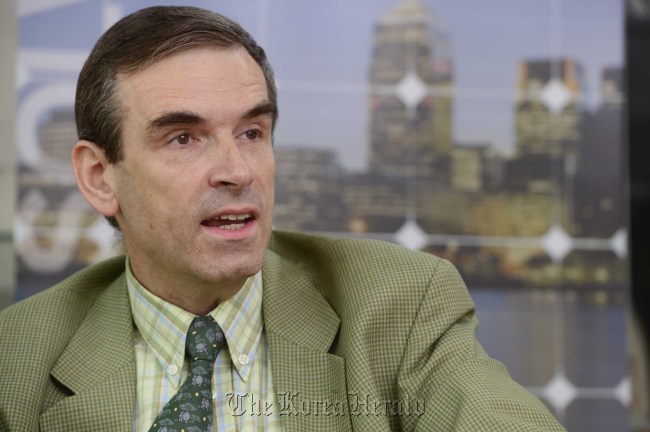Belgian CEO speaks on business, new entity to replace EUCCK
Andre Nothomb has two official work titles: one is chief executive of Solvay Korea Co. and the other is finance officer of Solvay Special Chemicals global business unit.
He earned the latter title as the Belgian chemical company with a history of 149 years chose Seoul as the headquarters for its special chemicals business last year.
A Solvay research and development center is under construction within the Ewha Womans University campus in Seoul due for completion in November 2013.
“Ewha offered us attractive conditions in terms of flexibility and financial matters. In 2014, we will move into the new building where we will have about 80 staff (members), mostly in R&D,” Nothomb said in an interview with The Korea Herald last week.
Andre Nothomb has two official work titles: one is chief executive of Solvay Korea Co. and the other is finance officer of Solvay Special Chemicals global business unit.
He earned the latter title as the Belgian chemical company with a history of 149 years chose Seoul as the headquarters for its special chemicals business last year.
A Solvay research and development center is under construction within the Ewha Womans University campus in Seoul due for completion in November 2013.
“Ewha offered us attractive conditions in terms of flexibility and financial matters. In 2014, we will move into the new building where we will have about 80 staff (members), mostly in R&D,” Nothomb said in an interview with The Korea Herald last week.

Solvay is busy discussing logistics as it took over Rhodia, a French chemical company which has had a bigger presence in the Korean market than Solvay, late last year.
Solvay has about 170 employees, an office in downtown Seoul and a factory in Ulsan. Rhodia has 300 staffers, a big office in Gangnam and factories in Ulsan and Incheon.
Nothomb also had a non-paid job as the vice president of the European Union Chamber of Commerce in Korea until the institution was disbanded early this month.
The EUCCK decided to shut itself down after it was slapped with fines and overdue taxes worth 4.5 billion won ($4 million), and launch a new entity with an up-to-date platform, new governance and a precise mandate.
The EUCCK, which was registered as a “foreigners’ organization” when it was established in 1986, became a legally unregistered group in 1999 as the related law was revised.
Korean tax authorities conducted an inquiry on the EUCCK earlier this year and ordered the group to pay 2.6 billion won in overdue value-added taxes and 1.9 billion won in fines for not issuing tax invoices for income earned through profit-seeking activities in Korea such as receiving fees for running advertisements in its magazine.
“The EUCCK was designed in the 1980s when Korea was still a pioneering country and before the European Union had any kind of diplomatic representation here. (The EUCCK) was a very loose organization whose board of directors had full-time jobs running their own companies,” Nothomb said.
“Today, there is big work underway to set up a modern platform to serve the same purpose of connecting the companies as an interface between them and the Korean government, and the old board will not be a part of it.”
The EUCCK’s paid staff consisted of a secretary-general and his assistant as well as a small number of junior staffers mostly in their 20s.
“Apparently, the EUCCK’s operations and accounting were not very transparent and there was a big misunderstanding between the tax authorities and the board. The tax authorities thought the board knew everything, but we didn’t,” he said.
The EUCCK served important purposes, with the EU using it as a verification organization for good implementation of the free trade agreement with Korea, according to Nothomb.
When the Belgian businessman first came to Korea in 1990, he joined the American Chamber of Commerce in Korea to get a quick lesson on the new environment.
“It was a time when a lot of things could be done without documentation. Basically any foreigner could teach English at a university with no papers to prove his credentials,” he said.
“The new entity that will replace the EUCCK will have some kind of legal base.”
AmCham has a legal base in the U.S.
There are just a handful of Belgian companies in Korea, mostly high-tech and small or medium-sized.
Solvay is a business-to-business firm that sells mostly semi-finished products such as materials for microchips in cell phones, advanced polymers and fluorinated products. Its biggest customers here are Samsung and LG.
Starting with 50:50 joint ventures with Hanwha (then Hanyang Chemical) and Samsung CRT in the 1980s to produce brown tube television glass, Solvay was guided by Samsung to the need to develop liquid crystal displays in the 2000s.
The JVs were dissolved, and Solvay moved on to partnerships with small start-up companies, which was a good base for technological innovation, Nothomb said.
“With not so much money or time, you could find new ways of innovation with the start-up ventures here in LCD display, pigments and new materials that were unavailable in the past,” he said.
“The impressive results caught the attention of our headquarters, and eventually, the headquarters of special chemicals, which generated around 10 percent of Solvay Group’s sales before the merger, moved to Seoul as we decided Korea was the place to be for technological innovation and to hear what the market wants.”
Including Rhodia, Solvay generated sales of around half a billion euros in Korea last year. Solvay’s global sales amounted to about 15 billion euros.
By Kim So-hyun (sophie@heraldcorp.com)
-
Articles by Korea Herald



![[KH Explains] Hyundai Motor’s plan for new landmark keeps hitting bumps](http://res.heraldm.com/phpwas/restmb_idxmake.php?idx=644&simg=/content/image/2024/05/13/20240513050626_0.jpg&u=20240513192803)


![[Grace Kao] American racism against Stray Kids](http://res.heraldm.com/phpwas/restmb_idxmake.php?idx=644&simg=/content/image/2024/05/13/20240513050827_0.jpg&u=)




![[Graphic News] Over 80% of people filing bankruptcy in Seoul in their 50s and older](http://res.heraldm.com/phpwas/restmb_idxmake.php?idx=644&simg=/content/image/2024/05/12/20240512050205_0.gif&u=)







